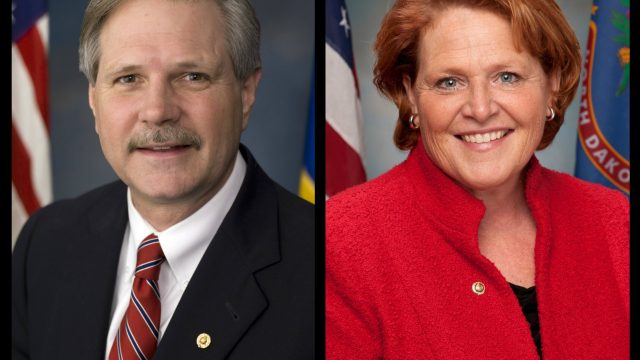Streyle, Holmberg, Rohr: Senate Vacancies Bill Not About Politics

This was submitted by Rep. Roscoe Streyle of Minot, Rep. Karen Rohr of Mandan, and Senator Ray Holmberg of Grand Forks.
Critics miss the mark when they assign motive to the sponsors of the legislation (HB1181) to change North Dakota’s method for filling U.S. Senate vacancies. While there is no doubt that the decision to forward this bill was prompted by the potential for Heidi Heitkamp’s possible exit from the U.S. Senate, our motivation was founded in our belief that voters and elections, not political relationships and party affiliations, should decide who serve in the highest offices of this state and nation.
[mks_pullquote align=”right” width=”300″ size=”24″ bg_color=”#000000″ txt_color=”#ffffff”]Accusations that our bill is nothing more than partisan politics ignores that this bill does nothing legally to restrict Sen. Heitkamp from running for governor. These accusations also ignore that the provision is just as likely to affect Republican Sen. John Hoeven’s seat should he leave for a cabinet post or higher office.[/mks_pullquote]
The process for filling vacancies in the U.S. Senate has evolved over the years. At one time, the North Dakota Senate decided who would serve in the U.S. Senate. In 1913, the U.S. Constitution was changed to allow for the direct election of U.S. Senators. In 1992, Kent Conrad was elected in a special election to fill Sen. Burdick’s remaining term. Currently, a vacancy in the U.S. Senate is filled by gubernatorial appointment until the regularly scheduled general election. HB1181 would change North Dakota law to require a special election to be held within 95 days after a U.S. Senate seat is vacated.
Accusations that our bill is nothing more than partisan politics ignores that this bill does nothing legally to restrict Sen. Heitkamp from running for governor. These accusations also ignore that the provision is just as likely to affect Republican Sen. John Hoeven’s seat should he leave for a cabinet post or higher office.
We also chose to not include an interim appointment until the special election. We felt the special election window of 95 days was sufficiently short enough to not require the seat be filled in the interim. We also believed that the power of incumbency is so great, that appointment afforded an unfair advantage for the appointee regardless of political party. This proposed process to fill vacancies in the U.S. Senate is very similar to how we currently fill vacancies in the U.S. House. If it works for the House, it should also work well for the Senate.
The bottom line is that regardless of political advantage, HB1181 is good public policy because it trusts the voters to decide who should represent them in the U.S. Senate, and that is democracy at its best.




